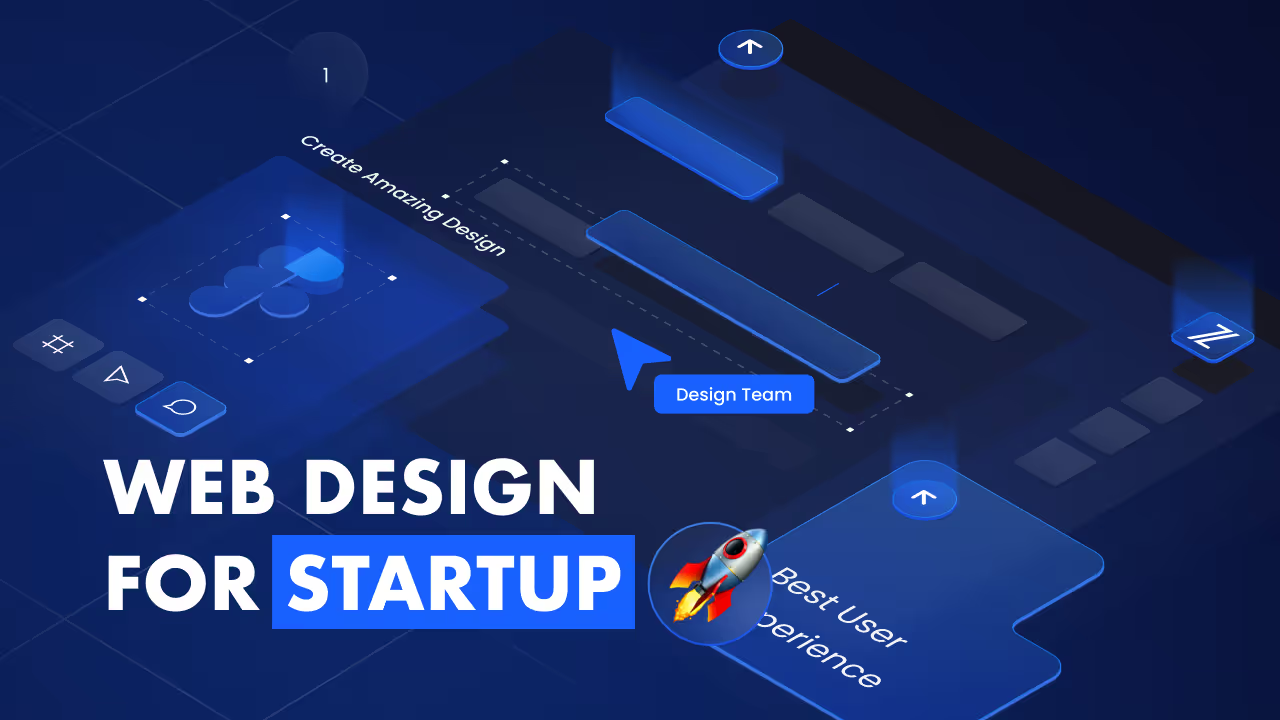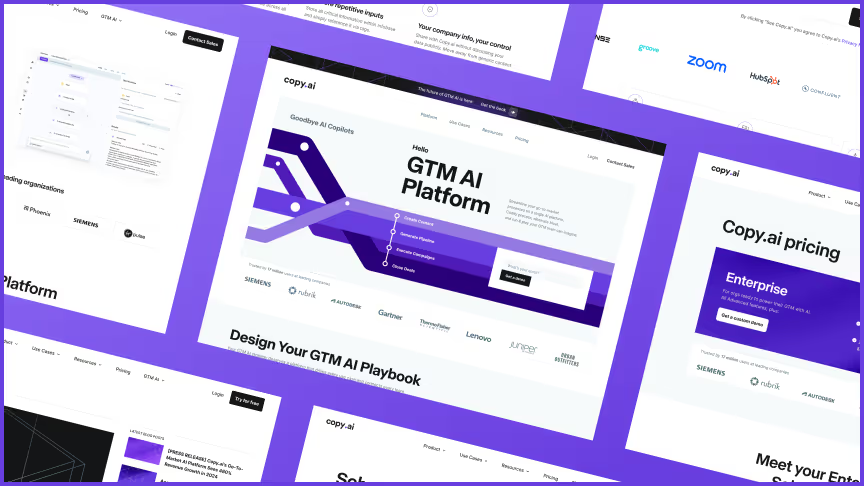Web Design for Startups: How to Build Fast and Launch Smarter
Startup Web Design: Key Trends, Strategies, and Innovations to Build a High-Performing, Engaging Website That Drives Growth.
.svg)
For startups, a website isn't just a digital space—it's the heartbeat of the brand. By embracing intuitive design, personalized experiences, and emerging technologies like AI and PWAs, startups can not only stand out but thrive in a competitive landscape.
For startups, a well-designed website is crucial for success. It serves as the online face of the business, showcasing products or services, engaging customers, and driving conversions. An effective web design for startups incorporates responsive design, intuitive navigation, and compelling content. It ensures a seamless user experience across devices, making information easily accessible to visitors.
A startup website design should reflect the company's values while standing out from competitors. It helps build brand recognition, increase customer engagement, and establish an emotional connection with potential customers. This guide explores the importance of web design for startups, trends in website design ideas and website design services, case studies of successful startup websites, and future directions for creating impactful online presences.
The Importance of Web Design for Startup Success
A user-friendly website design is crucial for capturing and retaining your audience's attention. With intuitive navigation, clear call-to-action buttons, and responsive layouts, users are more likely to engage with your content, leading to higher conversion rates. Your website's content should be informative, relevant, and engaging to address pain points and offer solutions, fostering interest and driving conversions.
Impact on brand identity
Your website is a primary touchpoint for communicating your brand identity online. The design elements, aesthetics, messaging, and user experience should align with your brand's personality and values. Consistent branding across your website and marketing channels strengthens brand recognition and reinforces your identity. Presenting content clearly and visually appealingly helps communicate your brand's message effectively.
Role in customer engagement
A professionally designed website ensures a great customer experience, which is vital for generating conversions. It plays a significant role in establishing credibility and trust. Following modern web design trends and maintaining a professional, credible appearance can prevent visitors from bouncing. Compelling content increases search engine ranking, establishes thought leadership, promotes customer trust, and keeps visitors engaged, ultimately boosting customer loyalty.
Trends in Startup Web Design
You must keep up with the latest web design trends to create an engaging and user-friendly website for your startup. Here are some current design trends and innovative features to consider:
Current design trends
Behavioral design motivates users to engage with your website through rewards and achievements. Speed and quick load times are crucial for optimizing user experience and search engine. Mobile-friendly and thumb-friendly designs cater to the increasing mobile audience. Voice optimization ensures your site ranks well for voice searches. Catchy color palettes influence brand perception and awareness. Videos create additional engagement points. Micro-interactions provide small, engaging responses to user actions.
Innovative features to consider
Focus on enhancing the user experience (UX) by simplifying navigation and optimizing forms. Personalization and customization allow tailoring content and recommendations to individual users. Prioritize accessibility and inclusivity for users with disabilities. Implement a responsive design that adapts to different devices and screen sizes. Adopt dark mode for aesthetic appeal and reduced eye strain. Embrace minimalist layouts with ample whitespace, clean typography, and a clear visual hierarchy. Incorporate trust-building elements like testimonials, reviews, and partner logos.
Case Studies of Successful Startup Websites
Examples from different industries
Successful startup websites span various industries and offer valuable insights. Lupage Digital, a digital marketing agency, exemplifies a well-designed portfolio site optimized for lead generation. Glossier's beauty brand showcases a customer-centric approach, fostering a loyal community through social media engagement and personalized experiences. Warby Parker revolutionized eyewear e-commerce by overcoming consumer hesitancy through strategic marketing and an exceptional customer experience. ColourPop's vibrant social media strategy highlights the power of user-generated content and influencer collaborations in the cosmetics space.
Lessons learned
These case studies demonstrate the importance of clear value propositions, simple user onboarding processes, and compelling content tailored to customer needs. Successful startups prioritize mobile-friendly and visually appealing designs, leveraging social proof and customer testimonials to build trust. Embracing innovative features like personalization, voice optimization, and micro-interactions enhances user engagement. Consistently updating content, optimizing for niche keywords, and investing in owned digital assets contribute to long-term growth and search visibility.
Future Directions in Startup Web Design
Emerging technologies
The web development landscape is rapidly evolving, and startups must stay ahead of the curve by embracing emerging technologies. Progressive Web Apps (PWAs) are a game-changer, blending web and mobile applications to offer offline functionality, faster loading times, and improved user engagement. By incorporating PWAs, you can ensure a seamless experience, fostering user loyalty and satisfaction, even in low-connectivity environments.
Voice search optimization is another critical aspect, with voice commerce sales expected to soar. Optimizing your website for voice search enhances accessibility and caters to the growing prevalence of voice assistants. Additionally, Single Page Applications (SPAs) provide a fluid user experience by dynamically updating content without full-page reloads, improving speed and responsiveness.
Potential future trends
Personalization is the key to enhancing user experience. Tailoring digital experiences based on user preferences and behaviors through data analytics can create personalized interfaces, recommend relevant content, and anticipate user needs, boosting satisfaction and conversions.
Sustainable web design is more than a trend; it's a responsibility. Adopting eco-friendly practices like optimizing server efficiency, reducing page load times, and using renewable energy sources aligns with corporate social responsibility and resonates with environmentally-conscious consumers.
Artificial Intelligence (AI) and Machine Learning (ML) are revolutionizing web development by enabling personalized experiences, predictive analytics, and content generation. As AI-powered technologies advance, they will play an increasingly significant role in shaping the future of web design for startups.
Explore Zabal's Frontend and Backend Development Solutions
At Zabal, we specialize in creating both visually appealing front-end designs and highly functional backend systems to ensure your website operates smoothly across all devices. Whether you need responsive, user-friendly web design or robust backend solutions that power everything from databases to APIs, our expert team is ready to support your startup's web development needs. Learn more about how we can help you build a scalable, fast, and reliable website that engages customers and drives conversions.
Conclusion
In today's competitive landscape, startups must prioritize web design to establish a strong online presence and foster business growth. A well-designed website serves as a powerful tool for attracting customers, building brand recognition, and driving conversions. By embracing responsive design, intuitive navigation, and compelling content, startups can create a seamless user experience across devices, positioning themselves for success.
As the digital landscape continues to evolve, startups must stay ahead of the curve by adopting emerging technologies like Progressive Web Apps, voice search optimization, and Artificial Intelligence. Personalization, sustainable design practices, and leveraging data analytics will be crucial for delivering tailored experiences and meeting evolving user expectations. By understanding the importance of web design, keeping up with trends, and implementing innovative features, startups can thrive in an increasingly competitive online environment.
FAQs
1. What essential elements should be included on a startup's website?
A startup website should prominently feature elements that build trust with visitors. This includes client testimonials, product reviews, partner logos, professional associations, and any awards the company has received. These elements are crucial in establishing credibility and attracting potential customers.
2. What are the preliminary steps to take before designing a website?
Before designing a website, it's important to follow these key steps: set clear expectations, identify the primary goal of your website, understand your target audience, plan the structure of your site, secure a suitable URL, analyze your competitors, and identify key SEO keywords. These steps are essential for creating a website that converts visitors into clients and customers.
3. What is the recommended starting point when designing a website?
When embarking on website design, begin by choosing a domain name and selecting a reliable hosting company. Next, decide on a platform for building your website, plan out your information architecture and content, select necessary plugins, create a layout for your site, and choose a theme to optimize your page design. This comprehensive approach ensures a solid foundation for your website.
4. What skills are necessary for a web designer?
To excel in web design, one needs to possess specific technical skills. Key areas include proficiency in programming languages like JavaScript and expertise in CSS frameworks such as Backbone, Foundation, and Bootstrap. These skills are essential for developing functional and responsive websites and mobile applications.
Share this article
Zabal Journal








